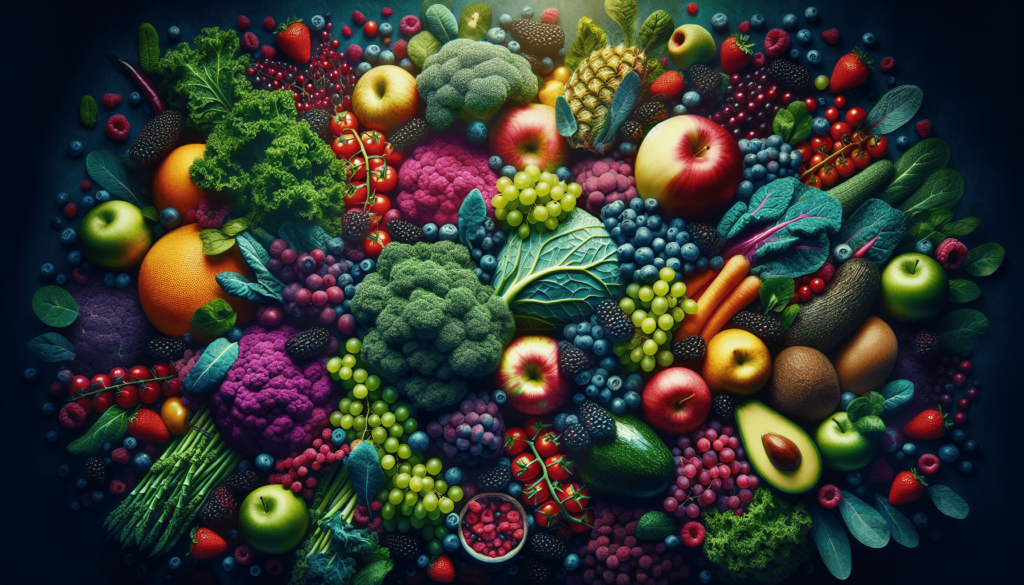Welcome to an article that explores the importance of nutrient bioavailability in your diet. Nutrient bioavailability refers to the amount of nutrients that your body is able to absorb and utilize from the foods you eat. Maximizing the bioavailability of nutrients can help ensure that you are getting the most benefit from the foods you consume. Stay tuned to discover how nutrient bioavailability impacts your overall health and well-being. Have you ever wondered why some nutrients are more easily absorbed by your body than others? In this article, we will explore the concept of nutrient bioavailability and why it is crucial for your overall health and well-being. Let’s delve into the world of nutrition and uncover why understanding the bioavailability of nutrients can make a significant difference in your health outcomes.

What is Nutrient Bioavailability?
Nutrient bioavailability refers to the extent and rate at which nutrients are absorbed and utilized by the body. It is a critical factor in determining the nutritional value of the foods you consume. Some nutrients are readily absorbed by the body, while others may require specific conditions or interactions with other nutrients to be effectively utilized. Understanding the bioavailability of nutrients can help you make informed choices about your diet and ensure that you are getting the most out of the foods you eat.
Importance of Nutrient Bioavailability
Understanding the bioavailability of nutrients is essential for maximizing the benefits of a healthy diet. When nutrients are not absorbed efficiently, your body may not receive the full nutritional value of the foods you consume. This can lead to deficiencies and health issues down the line. By focusing on foods that are high in bioavailable nutrients, you can ensure that your body is getting the essential vitamins and minerals it needs to function optimally.
Factors Affecting Nutrient Bioavailability
Several factors can influence the bioavailability of nutrients in the foods you eat. These factors can impact how well certain nutrients are absorbed and utilized by your body. By being aware of these factors, you can make informed decisions about your diet and improve the bioavailability of essential nutrients.
1. Nutrient Interactions
Some nutrients interact with each other in the body, either enhancing or inhibiting their absorption. For example, consuming vitamin C-rich foods alongside iron-rich foods can increase the bioavailability of iron, as vitamin C helps the body absorb iron more efficiently. Conversely, some compounds in certain foods can inhibit the absorption of nutrients. For example, phytates in whole grains can bind to minerals like zinc and reduce their absorption.
2. Food Processing
The way foods are processed and prepared can also affect the bioavailability of nutrients. Cooking, for example, can break down certain compounds in foods, making the nutrients more accessible to the body. On the other hand, processing methods like canning or refining can reduce the nutrient content of foods, lowering their bioavailability. Choosing minimally processed foods and incorporating a variety of cooking methods can help maximize the bioavailability of nutrients in your diet.
3. Gut Health
The health of your gut plays a significant role in the absorption of nutrients. An unhealthy gut can hinder the absorption of essential vitamins and minerals, even if you are consuming nutrient-rich foods. Factors like gastrointestinal disorders, gut inflammation, and imbalanced gut flora can impact nutrient bioavailability. Taking steps to support gut health, such as consuming probiotic-rich foods and fiber, can improve the absorption of nutrients in your gut.
4. Age and Health Conditions
Age and certain health conditions can also affect the bioavailability of nutrients. As you age, your body’s ability to absorb certain nutrients may decrease, increasing the risk of deficiencies. Health conditions like malabsorption disorders, food intolerances, and chronic diseases can also impact nutrient absorption. In such cases, working with a healthcare provider or a dietitian to address specific nutrient needs and optimize bioavailability is crucial.
5. Overall Diet Quality
The overall quality of your diet can impact the bioavailability of nutrients. Diets high in processed foods, sugars, and unhealthy fats may reduce the absorption of essential vitamins and minerals. On the other hand, a diet rich in whole, nutrient-dense foods can enhance the bioavailability of nutrients and support overall health. Balancing macronutrients, incorporating a variety of fruits and vegetables, and focusing on nutrient-rich foods can optimize the bioavailability of nutrients in your diet.
Maximizing Nutrient Bioavailability
Now that you understand the factors that can influence the bioavailability of nutrients, let’s explore some strategies to maximize the absorption of essential vitamins and minerals in your diet. By incorporating these tips into your daily routine, you can enhance the bioavailability of nutrients and optimize your overall health and well-being.
1. Pair Nutrient-Rich Foods
As mentioned earlier, pairing certain foods together can enhance the bioavailability of nutrients. For example, eating vitamin C-rich foods with iron-rich foods can improve the absorption of iron in the body. Similarly, consuming sources of vitamin D alongside calcium-rich foods can enhance calcium absorption. By strategically pairing foods that complement each other, you can maximize the bioavailability of essential nutrients in your diet.
2. Include Healthy Fats
Healthy fats play a crucial role in nutrient absorption, particularly fat-soluble vitamins like A, D, E, and K. Including sources of healthy fats like nuts, seeds, avocados, and olive oil in your meals can enhance the bioavailability of these vitamins. Additionally, healthy fats help slow down the digestion of nutrients, allowing for better absorption in the body. Be sure to incorporate a variety of healthy fats into your diet to support optimal nutrient bioavailability.
3. Cook Foods Appropriately
The cooking method you choose can impact the bioavailability of nutrients in foods. Some nutrients are more readily absorbed when cooked, while others may be better consumed raw. For example, cooking tomatoes can increase the bioavailability of lycopene, a powerful antioxidant. On the other hand, certain heat-sensitive nutrients like vitamin C may be preserved better when consumed raw. Understanding the effects of cooking on nutrient bioavailability can help you make informed choices about how to prepare your meals.
4. Focus on Fiber-Rich Foods
Fiber-rich foods can support gut health and improve the absorption of nutrients in the body. Soluble fiber, in particular, acts as a prebiotic, feeding beneficial gut bacteria and promoting optimal nutrient absorption. Including a variety of fiber-rich foods like fruits, vegetables, whole grains, legumes, and nuts in your diet can enhance the bioavailability of essential vitamins and minerals. Aim to incorporate fiber-rich foods into your meals to support overall nutrient absorption.
5. Be Mindful of Supplements
While getting essential nutrients from whole foods is ideal, there are instances where supplements may be necessary to address specific deficiencies. When choosing supplements, opt for high-quality products that are bioavailable and easily absorbed by the body. Consider working with a healthcare provider or a registered dietitian to determine the appropriate supplements for your individual needs. It’s essential to be mindful of the type and dosage of supplements you take to avoid any adverse effects on nutrient bioavailability.
Conclusion
Nutrient bioavailability plays a crucial role in determining how effectively your body absorbs and utilizes essential vitamins and minerals. By understanding the factors that influence nutrient bioavailability and implementing strategies to maximize absorption, you can ensure that your body receives the full nutritional benefits of the foods you eat. Prioritizing nutrient-dense foods, supporting gut health, and making informed choices about your diet can help optimize the bioavailability of nutrients and support your overall health and well-being. Remember, small changes in your diet and lifestyle can make a significant impact on how your body processes and utilizes nutrients, ultimately leading to better health outcomes in the long run.


